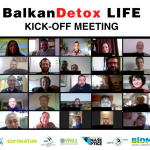[et_pb_section admin_label=”section”]
[et_pb_row admin_label=”row”]
[et_pb_column type=”4_4″][et_pb_text admin_label=”Text”]Launch of EU-funded project raises awareness and strengthens national capacities to fight the problem of wildlife poisoning in the Balkans, which is one of the most important causes of mortality and population decline for numerous threatened and endangered species.
Even though wildlife poisoning is illegal in the Balkans, this harmful practice is still widespread and poses a real threat to wildlife, especially vultures, the environment and public health. Thanks to conservation actions, there has been a lot of progress made, and now, the launch of an ambitious project brings new hope for further combating this problem! Through the ‘BalkanDetox LIFE’ project, nine organizations will work alongside various national and international stakeholders, ranging from government authorities to hunters and livestock breeders, to minimize this threat and achieve concrete results across seven Balkan countries.
“The BalkanDetox LIFE project was built on the good grounds made by the Vulture Conservation Foundation’s (VCF), Balkan Anti-Poisoning Project, especially in securing engagement of relevant governmental institutions for combating wildlife poisoning, and will enable the continuation of this initiative to improve management of poisoning incidents and achieve significant reduction of mortality of vultures and other affected species caused by this illegal practice in the region“, says Uroš Pantović from the and Project Coordinator of BalkanDetox LIFE.
The most common type of wildlife poisoning in the Balkans is the intentional placement of poison baits to kill wild predators or other feral and domestic animals that may inflict damage on livestock or game species. In addition to the animals targeted, other vulnerable species suffer too as it is a non-selective means of extirpating animals. Vultures as being mostly obligate scavengers often fall victim to poisoning, either by directly consuming the bait or feeding on the carcasses of poisoned animals. The frequent and successive poisoning incidents in the Balkans resulted in 465 confirmed vulture deaths over the past 20 years, and a VCF study estimates that at least 115 vultures die annually from poisoning in the Balkans since only about 20% of such incidents are discovered and documented.
“This alarming problem has caused severe depletion and even extinction of vultures species in Balkan countries, where populations are still very low and fragmented, and it is urgent to tackle the issue if we are to restore them to former levels and distribution. Vultures, also known as nature’s cleanup crew, remove rotting carcasses from the wild, helping to keep ecosystems healthy as they act as natural carcass recyclers and providing important environmental services for free that benefit nature, wildlife and society as a whole!“, says José Tavares, Director of the VCF.
The BalkanDetox LIFE project aims to shift the behaviour and perceptions of the multiple stakeholders, from the decision-makers to the general public and the actual users of poison baits. The project team will raise awareness about the severity of wildlife poisoning as well as advise on safe alternatives to the root-problem (human-wildlife conflict), such as preventative measures that do not harm animals or the environment. Furthermore, it will reinforce operational capacities and coordinate institutional actions to increase detection and improve management of poisoning incidents, facilitate an immediate and effective response to such incidents as well as strengthen enforcement to deter them. The final aim is to minimize the scale and scope of wildlife poisoning in the Balkans, and therefore helping safeguard nature and people!
“Illegal wildlife poisoning is an environmental crime, and as such we need an adequate involvement of authorities to register, investigate and punish these activities. This project will work alongside government enforcement agencies to achieve just that”, says Jovan Andevski, VCF’s Conservation Programmes Manager.
“Intentional wildlife poisoning in Albania hasn’t been regarded as a prohibited action in the legislation over years till July 2019 when use of poison baits and poisonous substances was defined as prohibited activity, with the amendments to the law “On the protection of fauna”. As a consequence, today, among other things, we are facing a lack of experience, knowledge, and capacities within state institutions which are responsible for combating this phenomenon. I believe that the involvement of these institutions in combating wildlife poisoning and their training under the Balkan Detox LIFE project will make a significant contribution to increasing the institutional knowledge and capacity, as well as help create a healthy structure and an efficient system for dealing with and punishing these issues in the future”, says Klea Duro, AOS’ Project Coordinator.
The ‘BalkanDetox LIFE’ project is a five-year endeavour with a €1.8 million budget, which received funding from the EU’s LIFE Programme, and it is co-financed by the VCF, the MAVA Foundation and Euronatur, as well as by the Whitley Fund for Nature and Environmental Protection and Energy Efficiency Fund for specific actions, and will be implemented across Albania, Bosnia & Herzegovina, Bulgaria, Croatia, Greece, North Macedonia and Serbia. Project partners are the Vulture Conservation Foundation as the coordinating beneficiary, and the Albanian Ornithological Society, Association BIOM, Bird Protection and Study Society of Serbia, Fund for Wild Flora and Fauna, Hellenic Ornithological Society, Macedonian Ecological Society, Ornitološko društvo NAŠE Ptice and the Protection and Preservation of Natural Environment in Albania. Furthermore, this project is based on Spanish best practice experience and counts on the support from Junta de Andalucía and the Ministry for the Ecological Transition and the Demographic Challenge.[/et_pb_text][/et_pb_column]
[/et_pb_row]
[/et_pb_section]





